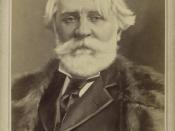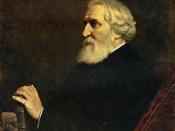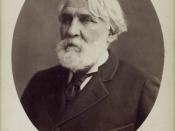Turgenev's revolutionary views were not born in the heart of mother Russia. In his travels through Europe he had a chance to study the most prominent philosophers of that time, absorb their ideas, and later implement them in his literary works. "The streets of revolutionary Paris taught him the unpleasant rudiments of crowd psychology, and the logic of the class struggle. The reaction which followed the upheaval of 1848 intensified his disgust with the governments, the philosophy, the art of his time" (Yarmolinsky, 99). In his novel Father's and Sons, Turgenev clearly shows his love for the character of Bazarov, whom Turgenev makes the tragic hero of that novel. Turgenev clearly sympathized with Bazarov, he treats this character with respect and dignity, and never letting this character to be embarrassed by others, and only in one occasion lets him lose his dignity, when dealing with a woman. Turgenev guides this character as a father would guide his son, he even lets him die in such a manner that the reader only imagines what great things could have happened if Bazarov would live.
"We might recall that Turgenev himself was so engrossed in his creation that he had kept a diary in Bazarov's name while writing the novel. In it he noted his hero's reactions to social and political events of the day. It is impossible to deny that he had the greatest sympathy for this hero. He was later to call Bazarov his "favorite offspring," and he frequently spoke of his admiration for him." (Knowles, 84).
According to A.V. Knowles, Turgenev clearly supports the revolutionary views of Bazarov. In my opinion it is not entirely true. If Turgenev would be so supportive of Bazarov he would not created characters such as Pavel, Odintsova, and Bazarov's parents. Pavel even though...


